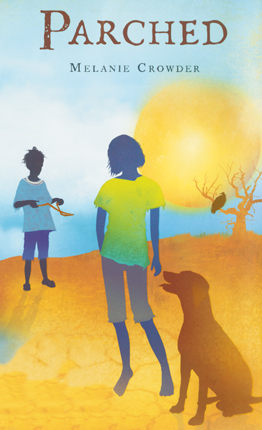| Parched Author: Crowder, Melanie | ||
| Price: $6.50 | ||
Summary:
Told from three perspectives, Sarel, who just witnessed the brutal murder of her parents, Nandi, the leader of a pack of dogs who looks out for her pups and Sarel, and Musa, an escaped prisoner with the water song inside him, struggle to survive in a land without water.
| Accelerated Reader Information: Interest Level: MG Reading Level: 5.40 Points: 3.0 Quiz: 158672 | Reading Counts Information: Interest Level: 3-5 Reading Level: 5.70 Points: 7.0 Quiz: 60933 | |
Reviews:
Kirkus Reviews (05/01/13)
School Library Journal (05/01/13)
Booklist (06/01/13)
The Bulletin of the Center for Children's Books (+) (09/13)
Full Text Reviews:
School Library Journal - 04/20/2013 Gr 5–8—Imagine life with no water-no rain, no dew, no rivers or lakes-nothing. This sparely written tale tells of two young teens working together to survive a devastating drought in southern Africa. Musa, an African boy, has been sold into slavery because of his dowsing ability. His cruel owners keep him alive only to use his talents. Sarel, a Caucasian girl, faces an uncertain future after her parents are brutally shot by thugs looking for water. Alone with her family's pack of Rhodesian ridgebacks in the African bush, she decides to leave her homestead. But Nandi, leader of the dog pack, refuses to leave. She senses help is coming. Musa escapes his captors and flees toward the only water source he senses-across the desert, near Sarel's home. Nearly dead from dehydration, he collapses upon meeting Sarel. Grudgingly, she nurses him back to health. Together, they attempt to find what Musa knows is there. The story moves well, alternating among the perspectives of Sarel, Musa, and Nandi. However, it is slightly jarring to continually transition between human and canine perspectives. The writing, especially the descriptions of the drought conditions and extreme thirst, is excellent. Readers develop a cheerleader relationship with Sarel and Musa, hoping with each chapter that they will find water, somewhere, somehow. This is by no means an essential purchase, but it is a compelling read.—Lisa Crandall, formerly at the Capital Area District Library, Holt, MI - Copyright 2013 Publishers Weekly, Library Journal and/or School Library Journal used with permission.
Booklist - 06/01/2013 The desperate search for water is the haunting drama in this spare contemporary survival story. After her parents are slaughtered, Sarel runs from home into the dry desert. Her dog Nandi runs with her. In the city, young Musa escapes from the gang that kept him prisoner. Can the three fugitives trust each other and survive together? The girl, the boy, and the dog tell their stories in spare alternating narratives as they run through the drought-stricken countryside, remembering the horror left behind, and always driven by the overwhelming search for water. Musa has the special power to use dowsing sticks to find water beneath the ground, which is why his captors held him. Now can he find a well or a river to save himself and his companions? From the title on, the direct, powerful prose in this first novel dramatizes the exciting contemporary survival story. The climax will stay with readers: the elemental bliss of slaking thirst with a drink of water at last. Fans of Gary Paulsen’s Hatchet (1987) will want this. - Copyright 2013 Booklist.
Bulletin for the Center... - 09/01/2013 Three narrators-Sarel, a white girl; Musa, a black boy; and Nandi, one of the lion-hunting dogs that Sarel’s father breeds-share this gripping story that begins during a serious drought in an unspecified African setting. The Tandie, a militant gang, murder Sarel’s parents, whose farm had access to a secret spring, and kidnap young Musa, forcing the boy, a natural dowser, to search for underground water. With only Nandi and the other dogs to help her, Sarel must somehow find water, food, and a shady place to survive. When Musa manages to escape his captors, he joins forces with Sarel, but can they find the hidden water before the ruthless Tandie hunt Musa down or the drought kills them? Crowder’s spare storytelling and third-person narration provide young readers some safe distance for witnessing the tragic events, while well-chosen details and taut descriptions effectively convey the intensity of the situation. The lack of identifying specifics about the setting, the area’s history, and even Sarel (who is not revealed as being white until midway through the book) and Musa means that readers will need to read carefully to piece together what is going on, but the immediacy that results from being thrust into the middle of things makes the story immensely engaging. The ending may leave some readers wanting to know what will happen next, but overall this is a poetic and powerful survival story; readers will want to tackle it with a full water bottle on hand. JH - Copyright 2013 The Board of Trustees of the University of Illinois.



